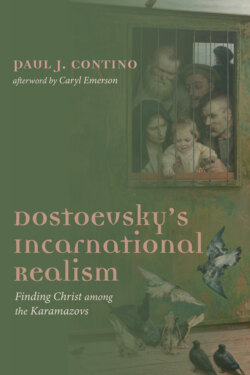Читать книгу Dostoevsky's Incarnational Realism - Paul J. Contino - Страница 5
На сайте Литреса книга снята с продажи.
Оглавление“Literary criticism should arise out of a debt of love. In a manner evident and yet mysterious, the poem or the drama or the novel seizes upon our imaginings. We are not the same when we put down the work as we were when we took it up.”
—George Steiner, Tolstoy or Dostoevsky
“The only wisdom we can hope to acquire Is the wisdom of humility: humility is endless. . . . And what there is to conquer By strength and submission, has already been discovered Once or twice, or several times, by men whom one cannot hope To emulate —but there is no competition— There is only the fight to recover what has been lost And found and lost again and again: and now, under conditions That seem unpropitious. But perhaps neither gain nor loss. For us, there is only the trying. The rest is not our business.”
—T. S. Eliot, “East Coker,” The Four Quartets
“The hint half guessed, the gift half understood, is Incarnation.Here the impossible union Of spheres of existence is actual,Here the past and future Are conquered, and reconciled . . .”
—T. S. Eliot, “The Dry Salvages,” The Four Quartets
“No one teaches contemplation except God, Who gives it. The best you can do is write something or say something that will serve as an occasion for someone else to realize what God wants of [her] or him.”
—Thomas Merton, New Seeds of Contemplation
“Nothing is absolutely dead: every meaning will have its homecoming festival.”
—Mikhail Bakhtin, “Methodology in the Human Sciences”
“I believe that for all of us [Dostoevsky] is an author that we must read and reread due to his wisdom.”
—Pope Francis1
